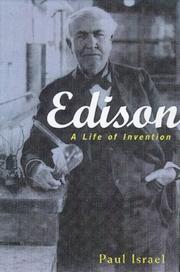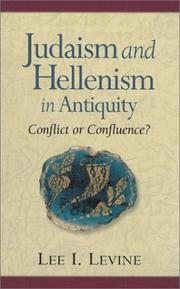| Listing 1 - 10 of 28 | << page >> |
Sort by
|

ISBN: 0471529427 Year: 1998 Publisher: Wiley
Abstract | Keywords | Export | Availability | Bookmark
 Loading...
Loading...Choose an application
- Reference Manager
- EndNote
- RefWorks (Direct export to RefWorks)
Inventors --- Biography --- Edison, Thomas A. --- Ai-ti-sheng, --- Edison, Thomas Alva, --- Ėdison, Tomas Alʹva, --- Ėdisson, Tomas-Alʹva, --- トーマス· A ·エジソン, --- United States --- Edison, Thomas A. - (Thomas Alva) - 1847-1931.

ISBN: 0804765243 9780804765244 0804729298 9780804729291 Year: 1998 Publisher: Stanford (Calif.): Stanford university press
Abstract | Keywords | Export | Availability | Bookmark
 Loading...
Loading...Choose an application
- Reference Manager
- EndNote
- RefWorks (Direct export to RefWorks)
In the summer of 1937, Japanese troops occupied the campuses of Beijing’s two leading universities, Beida and Qinghua, and reduced Nankai, in Tianjin, to rubble. These were China's leading institutions of higher learning, run by men educated in the West and committed to modern liberal education. The three universities first moved to Changsha, 900 miles southwest of Beijing, where they joined forces. But with the fall of Nanjing in mid-December, many students left to fight the Japanese, who soon began bombing Changsha. In February 1938, the 800 remaining students and faculty made the thousand-mile trek to Kunming, in China’s remote, mountainous southwest, where they formed the National Southwest Associated University (Lianda). In makeshift quarters, subject to sporadic bombing by the Japanese and shortages of food, books, and clothing, students and professors did their best to conduct a modern university. In the next eight years, many of China’s most prominent intellectuals taught or studied at Lianda. This book is the story of their lives and work under extraordinary conditions. Lianda’s wartime saga crystallized the experience of a generation of Chinese intellectuals, beginning with epic journeys, followed by years of privation and endurance, and concluding with politicization, polarization, and radicalization, as China moved from a war of resistance against a foreign foe to a civil war pitting brother against brother. The Lianda community, which had entered the war fiercely loyal to the government of Chiang Kai-shek, emerged in 1946 as a bastion of criticism of China’s ruling Guomindang party. Within three years, the majority of the Lianda community, now returned to its north China campuses in Beijing and Tianjin, was prepared to accept Communist rule. In addition to struggling for physical survival, Lianda’s faculty and students spent the war years striving to uphold a model of higher education in which modern universities, based in large part on the American model, sought to preserve liberal education, political autonomy, and academic freedom. Successful in the face of wartime privations, enemy air raids, and Guomindang pressure, Lianda’s constituent universities eventually succumbed to Communist control. By 1952, the Lianda ideal had been replaced with a politicized and technocratic model borrowed from the Soviet Union.
Sino-Japanese War, 1937-1945 --- Education --- Children --- Education, Primitive --- Education of children --- Human resource development --- Instruction --- Pedagogy --- Schooling --- Students --- Youth --- Civilization --- Learning and scholarship --- Mental discipline --- Schools --- Teaching --- Training --- Education and the war. --- Political aspects --- History --- Xi nan lian he da xue (Kunming Shi, China) --- Qing hua da xue (Beijing, China) --- Beijing da xue --- Nan kai da xue (Tianjin, China) --- Hsi nan lien ho ta hsüeh (Kunming, China) --- Hsi-nan lien ho ta hsüeh, Kunming, China --- Kunming Shi (China). --- National Southwest Associated University (Kunming Shi, China) --- Guo li xi nan lian he da xue (Kunming Shi, China) --- Xi nan lian da (Kunming Shi, China) --- Associated University of the Southwest (Kunming Shi, China) --- Lianda (Kunming Shi, China) --- National Southwest University (Kunming Shi, China) --- Southwest Associated University (Kunming Shi, China) --- 西南联合大学 (昆明市中囯) --- 西南联合大学 (昆明市中国) --- 西南联合大学 (昆明市中國) --- 西南联合大学 (Kuming Shi, China) --- 西南联合大学 (Kunming Shi, China) --- 西南聯合大學 (昆明市中國) --- 西南聯合大學 (昆明市, China) --- 西南聯合大學 (Kunming, China) --- China --- Politics and government --- 378.4 <51 KUNMING> --- 378.4 <51 KUNMING> Universiteiten--China--KUNMING --- Universiteiten--China--KUNMING --- Education and the war --- Xinan lianda (Kunming Shi, China)

ISBN: 0471362700 Year: 1998 Publisher: New York : John Wiley,
Abstract | Keywords | Export | Availability | Bookmark
 Loading...
Loading...Choose an application
- Reference Manager
- EndNote
- RefWorks (Direct export to RefWorks)

ISBN: 286959397X Year: 1998 Publisher: Paris : Arléa,
Abstract | Keywords | Export | Availability | Bookmark
 Loading...
Loading...Choose an application
- Reference Manager
- EndNote
- RefWorks (Direct export to RefWorks)
Écrivains yiddish --- Écrivains israéliens --- Biographies --- Biographies --- Singer, Isaac Bashevis, --- Zamir, Israel

ISBN: 2275001514 9782275001517 Year: 1998 Publisher: Paris Librairie générale de droit et de jurisprudence
Abstract | Keywords | Export | Availability | Bookmark
 Loading...
Loading...Choose an application
- Reference Manager
- EndNote
- RefWorks (Direct export to RefWorks)
La liberté est une des plus belles conquêtes de l'homme. Mais, ce bien précieux, encore trop rare, reste fragile. C'est la raison pour laquelle le droit des libertés occupe une place de plus en plus importante dans les pays démocratiques, qui constituent autant de sociétés de Droit. L'ouvrage décrit d'abord, au travers de la théorie générale des libertés, la société de Droit, pour mieux en apprécier ensuite les composantes, c'est-à-dire la société des droits, par la présentation des principales libertés en droit français. Ce manuel s'adresse particulièrement aux étudiants, 'notamment ceux de licence en droit, puisque le cours de droit des libertés fondamentales correspond à l'ancien cours de libertés publiques et aux candidats aux différents examens ou concours de la fonction publique et à l'examen d'accès aux centres régionaux de formation professionnelle d'avocats (C.R.E.P.A.). Il intéresse aussi les praticiens, qui contribuent à la mise en oeuvre et au respect des libertés fondamentales. Il se veut également accessible à l'honnête homme souhaitant, à l'aube du troisième millénaire, faire le point sur l'état des libertés, spécialement en France.
Civil rights --- Droits de l'homme --- -Basic rights --- Civil liberties --- Constitutional rights --- Fundamental rights --- Rights, Civil --- Constitutional law --- Human rights --- Political persecution --- Law and legislation --- -Civil rights --- Civil rights - France
Book
Abstract | Keywords | Export | Availability | Bookmark
 Loading...
Loading...Choose an application
- Reference Manager
- EndNote
- RefWorks (Direct export to RefWorks)

ISBN: 9780198730729 9780198207344 9780198730721 0198207344 Year: 1998 Publisher: Oxford: Clarendon,
Abstract | Keywords | Export | Availability | Bookmark
 Loading...
Loading...Choose an application
- Reference Manager
- EndNote
- RefWorks (Direct export to RefWorks)

ISBN: 1565634888 9781565634886 Year: 1998 Publisher: Peabody: Hendrickson Publishers,
Abstract | Keywords | Export | Availability | Bookmark
 Loading...
Loading...Choose an application
- Reference Manager
- EndNote
- RefWorks (Direct export to RefWorks)
Judaism --- Jews --- Judaism --- Synagogues --- Hellenism. --- Greece
Periodical
Year: 1998 Publisher: Jerusalem
Abstract | Keywords | Export | Availability | Bookmark
 Loading...
Loading...Choose an application
- Reference Manager
- EndNote
- RefWorks (Direct export to RefWorks)
Book
Year: 1998 Publisher: Oxford Clarendon press
Abstract | Keywords | Export | Availability | Bookmark
 Loading...
Loading...Choose an application
- Reference Manager
- EndNote
- RefWorks (Direct export to RefWorks)
History --- geschiedenis --- Netherlands --- Belgium
| Listing 1 - 10 of 28 | << page >> |
Sort by
|

 Search
Search Feedback
Feedback About UniCat
About UniCat  Help
Help News
News